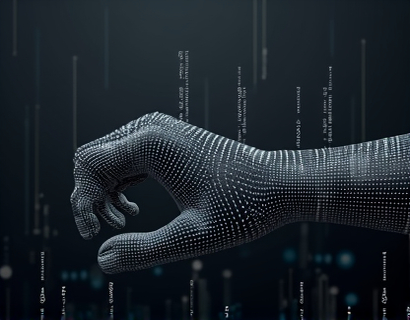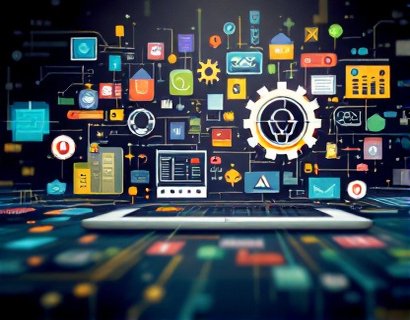Revolutionizing Digital Experiences: The Synergy of Crypto and AI
The intersection of cryptocurrency and artificial intelligence is giving rise to groundbreaking solutions that are redefining digital transformation. For tech innovators and early adopters, this convergence offers unprecedented opportunities to elevate their online presence and experience seamless, advanced applications. This article delves into the transformative power of combining these two revolutionary technologies, exploring how they are reshaping the digital landscape and empowering users with next-gen tools.
Understanding the Basics: Crypto and AI
To fully appreciate the impact of integrating cryptocurrency and artificial intelligence, it's essential to understand the fundamentals of each technology. Cryptocurrency, a digital or virtual currency secured by cryptography, operates on a decentralized network known as a blockchain. This technology ensures transparency, security, and immutability, making it an ideal foundation for various applications beyond mere transactions.
Artificial intelligence, on the other hand, encompasses a range of technologies that enable machines to perform tasks that traditionally required human intelligence. These tasks include learning from data, recognizing patterns, making decisions, and even performing actions that mimic human behavior. The combination of these two technologies opens up a realm of possibilities, particularly in enhancing digital experiences.
The Power of Decentralization
One of the key advantages of cryptocurrency is decentralization. Unlike traditional financial systems, which rely on central authorities, cryptocurrencies operate on a peer-to-peer network. This decentralization not only reduces the risk of single points of failure but also empowers users by giving them control over their digital assets. When combined with AI, decentralization can lead to more autonomous and user-centric applications.
For instance, AI-driven decentralized applications (dApps) can leverage blockchain to create trustless environments where users interact without intermediaries. These applications can use machine learning algorithms to personalize user experiences, predict behavior, and optimize resource allocation, all while maintaining the integrity and security of the decentralized network.
Enhanced Security through Crypto and AI
Security is a paramount concern in the digital world, and the integration of cryptocurrency and AI offers robust solutions. AI can enhance security measures by detecting and mitigating threats in real-time. Machine learning models can analyze vast amounts of data to identify patterns indicative of fraudulent activities or security breaches, allowing for proactive measures to be taken.
Moreover, the use of smart contracts, which are self-executing contracts with the terms directly written into code, can further enhance security. When combined with AI, smart contracts can adapt to new scenarios and threats, ensuring that the system remains secure and resilient. This synergy not only protects user data but also builds trust in digital platforms.
Personalization and User Experience
AI's ability to process and analyze large datasets makes it an invaluable tool for personalization. In the context of cryptocurrency, AI can be used to tailor financial services and products to individual user preferences and behaviors. For example, AI-driven platforms can offer customized investment advice, risk assessments, and portfolio management tools, all based on a user's unique profile and market conditions.
When integrated with cryptocurrency, these personalized experiences can extend to digital assets and transactions. Users can enjoy seamless, intuitive interactions with crypto services, from wallet management to trading and investing. The combination of AI and crypto ensures that users have a tailored and secure digital experience, enhancing overall satisfaction and engagement.
Efficient and Transparent Transactions
One of the most significant benefits of cryptocurrency is its potential to streamline transactions. Traditional financial systems often involve multiple intermediaries, leading to delays and higher costs. Cryptocurrency transactions, facilitated by blockchain, are faster, cheaper, and more transparent. AI can further optimize this process by predicting transaction patterns, reducing congestion on the network, and improving scalability.
AI algorithms can also ensure that transactions are processed efficiently and securely. By analyzing historical data and real-time market conditions, AI can optimize transaction fees, minimize risks, and enhance the overall user experience. This efficiency is particularly valuable for businesses and individuals who rely on frequent and reliable crypto transactions.
Innovative Financial Instruments
The combination of cryptocurrency and AI is giving birth to innovative financial instruments that were previously unimaginable. For example, AI-driven decentralized finance (DeFi) platforms offer a range of services such as lending, borrowing, and yield farming, all without traditional financial intermediaries. These platforms use smart contracts and machine learning to create dynamic, adaptive financial products that cater to diverse user needs.
Another exciting development is the creation of AI-powered NFTs (Non-Fungible Tokens). These unique digital assets can represent a wide range of value, from art and collectibles to virtual real estate and in-game items. AI can enhance NFTs by adding dynamic properties, such as changing attributes based on user interaction or market trends, making them more engaging and valuable.
Data Privacy and User Control
Data privacy is a growing concern in the digital age, and the integration of cryptocurrency and AI offers solutions that prioritize user control and privacy. Blockchain's inherent transparency can be combined with zero-knowledge proofs and other cryptographic techniques to ensure that user data remains private while still being verifiable. AI can further enhance this by enabling users to manage their data permissions and consent in a seamless and automated manner.
Users can have granular control over their data, deciding who can access it and for what purposes. This level of control not only empowers users but also fosters a more trustworthy and ethical digital ecosystem. AI-driven tools can help users monitor and manage their digital footprint, ensuring that their privacy is maintained in the increasingly connected world.
Scalability and Interoperability
As the adoption of cryptocurrency and AI grows, scalability and interoperability become critical challenges. AI can play a pivotal role in addressing these issues by optimizing network performance and facilitating seamless interactions between different blockchain platforms. Machine learning algorithms can predict network congestion, optimize transaction routing, and enhance the overall efficiency of decentralized systems.
Interoperability is equally important, as it allows different blockchain networks and decentralized applications to communicate and work together. AI can help develop standards and protocols that ensure smooth interactions, making it easier for users to leverage a wide range of crypto and AI-driven services without friction. This interconnectedness is essential for building a robust and inclusive digital economy.
Future Prospects and Challenges
The future of crypto and AI is promising, with numerous potential applications and innovations on the horizon. However, there are also challenges that need to be addressed to fully realize the potential of this synergy. Regulatory frameworks must evolve to accommodate the unique characteristics of decentralized technologies, ensuring that innovation is not stifled while protecting users and maintaining market integrity.
Technical challenges, such as improving blockchain scalability and enhancing the accuracy of AI models, also need to be overcome. Collaboration between technologists, policymakers, and industry stakeholders is crucial to address these challenges and create a supportive environment for growth.
Despite these challenges, the potential benefits are immense. The combination of cryptocurrency and AI has the power to transform digital experiences, making them more secure, personalized, efficient, and empowering. For tech innovators and early adopters, embracing these technologies can lead to significant advantages and open up new frontiers in the digital world.











































